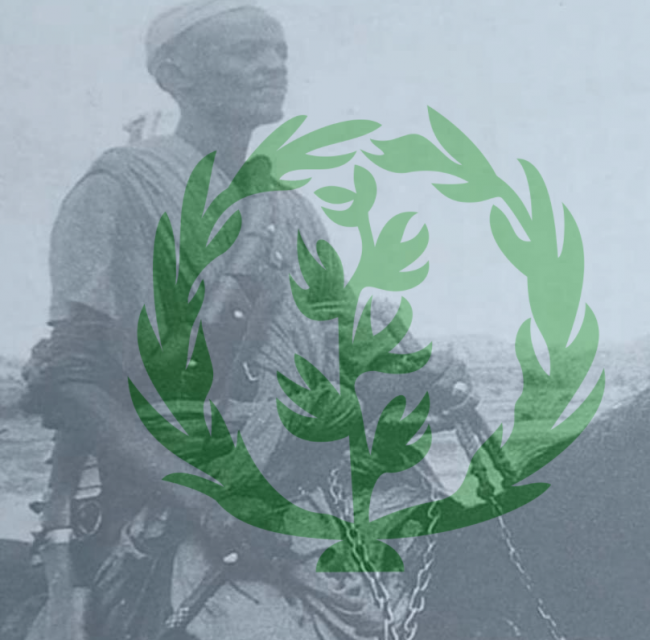Radio Erena: 31 August 2020

Celebrating the First of September the anniversary of the Eritrean Revolution, many Eritreans change their profile pictures on Facebook, WhatsApp, and Twitter. The dominant replacement picture would be of a man on a horse with a rifle in hand and a celestial blue flag with an olive branch in the background. The knight in the picture is Hamid Idris Awate, the father of the Eritrean Revolution. Mt Adal, the place where the first bullet of the armed struggle was fired and Awate’s name, has become national brand names that cannot be separated from the month of September.
As the First of September is popularly celebrated with pride, only one man seems to have a grudge against the day: Isaias Afwerki, the selfsame man who considers himself the father of the Eritrean independence; and he is the one who has pangs that he is not the father of both: the Eritrean Revolution and the Eritrean Independence at the same time. Deprived of securing the two honors in his pocket, he habitually treated September Day with disdainful negligence.
Grudges and pangs aside, the Revolution’s Day is not deservedly celebrated inside Eritrea. Simply, because the ideals and the dreams enshrined in the spirit of the Revolution are deeply buried in the infertile soil of a country under a rouge dictator who runs the country against all the aspirations that the Revolution fought for.
Eritrea has a bizarre long history of dark chapters of earlier despotism and suppression. During the Italian colonial rule from the moment of declaring the colony in 1891 to the official renunciation of it in 1947, Eritreans suffered from racial discrimination, downright suppression, and forced soldiery. When Italy was defeated in the Second World War, Eritrea was entrusted to Britain by the four vanquishing powers: the USA, France, Britain, and the former Soviet Union. Pending a decision of the UN on the fate of the Italian Africa colonies; and in less than a decade interval 1946-1952, the Eritreans were given the opportunity to discuss the future of their country after long and dense years of silencing the voices of the dissent. This was the time when division reigned supreme. Eritreans were divided into two extremely opposing camps: the Independence Camp and the camp which called for an unconditional union with Ethiopia. Furthermore, the British were trying to divide the colony between Sudan and Ethiopia, which were under British rule and influence.
Ethiopia availed the Pro-Union camp all her resources and support and introduced barefaced intimidation and terrorism with implicit British complicity against the exponents of independence. Much of that is history; nevertheless, the political and diplomatic conflict produced a satisfy-all diplomatic federation union plan between Eritrea and Ethiopian in 1952. The federation aimed at convincing the Pro-Independence camp that the formula is the best they can have. It was also accepted within the Unionist’ camp as an opportune step toward the long-awaited union between Eritrea and Ethiopia, whereas the UN and the international community were both convinced that the settlement would grant the region and the world the wished peace: nothing was furthermost from the truth. Ethiopia consequently rewarded the USA, the emerging superpower, with a listening post in Eritrea, as the super ally designed and imposed the federation on the UN. Ten years later, Ethiopia annulled the Federation and declared Eritrea its fourteenths province. The UN closed the dossier and the US gave unwavering support to Ethiopia.
As the aspirations for independence were crushed under the feet of such colossal enemies, the only resort left for the Eritrean people was the barrel of the gun. 1958 witnessed the biggest workers’ strike in the country and the birth of the Eritrean Liberation Movement ELM, and then the road had been paved for the advent of the Revolution.
A literally exceptional period of the Eritrean history started with the Eritrean Revolution. It was a history of a valiant struggle, cherished sacrifices, and a journey on the blood path that led to the total independence of the country after thirty cruel years. Eritreans gave Africa its longest and bravest struggle, so to the world. What the Eritreans find difficult to understand today is how all these sacrifices and heroism have ended up under the boots of a ruthless dictator.
This 59th Revolution anniversary finds the Eritreans, as always, divided between staunch supporters of the dictator, in one hand, and those who fight tooth and nails against injustice. Between the two is the silent majority inside the greatest African prison: Eritrea. If darkness prevails until September next year, then we would have, God, forbid, sixty-odd years of suffering and inferno.
By Fathi Osman
=============
